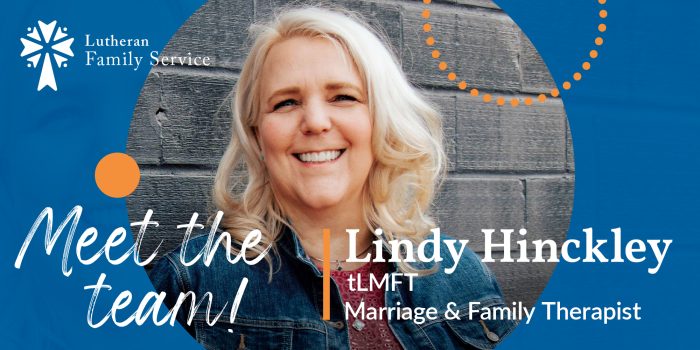Posted on September 1, 2023 by Lindy Hinckley, tLMFT
Lutheran Family Service News

Share
Other Blog Topics
Meet Lindy Hinckley, tLMFT, a marriage and family therapist serving clients in Deadwood, South Dakota, as well as the surrounding area including Sturgis and Rapid City, and throughout the state via telehealth. With a passion for fostering community and connection as an antidote to isolation, Lindy brings understanding and experience as a pastor’s wife and parent of a child with special needs.
Read on to hear more about how God brought her to serve in the mental health field, the empowering benefit of therapy, and the blessing of support groups.
I’m a marriage and family therapist and [part] of the church worker wellness team, so we do a lot of reaching out to congregations or individuals like pastors, their wives and children. I lead two Koinonia groups [for pastors’ wives]. I’m really into doing [all] kinds of groups, I like that dynamic–connecting people with other people. But I also love individual work, because everyone’s so different, so unique.
It’s been really fun to connect with pastors and their youth groups, presenting on technology and screen time.
In short, in 2014 my husband of almost 20 years passed away from the swine flu and it was pretty shocking. I was left with two little girls and I needed to provide for my family. I [had] always been a substitute teacher, and I’d also done music lessons. After praying about it for a long time, this is what the Lord gave me to do, mental health, to help other people and support them through life challenges. I had learned a lot of things going through that experience and to see my kids go through it. It was quite unexpected, but I love it. I feel like I’m serving God and it’s really great [when He] gives us things in ways we would not choose otherwise.
I think the Bible is the first marriage manual; I use it all the time. I have people memorizing Scripture. I use prayer, meditation, and Scripture study in helping people with their homework. [When] they have a strong connection to the Lord they are able to use that and make connections in their world. They might be able to use some of the things that we practice with therapy to make friends, or to become involved in church, to break out of isolation.
What is awesome about working [at LFS] is that you can do what really works, and Christ is what really works to help people.
Whether it’s anxiety, something in their marriage or family, or isolation, I feel like everyone has something that they can get a benefit from therapy. Just being able to speak out loud what’s bothering you, it’s very therapeutic. Having someone listen to you and [help create] a tailor made solution is very effective. I think anybody can benefit from therapy. You don’t have to be seriously mentally unhealthy. I say [it’s for] everybody.
Every support group starts out [with] everyone a little bit nervous to be there. But then over time they start sharing some really difficult things that they’re going through, that maybe they haven’t even shared with their family or anybody.
Support groups like DivorceCare or [those] helping people through difficult stages, addiction, or having been cheated on, or whatever, just to have others to be able to bounce ideas off with all these really deep problems — I think it’s a really good way to do things.
[Being a pastor’s wife] is a role that comes with a lot of loneliness and difficult situations that aren’t typical, so we have a place where we can kind of talk about things, support and encourage each other, and that’s been pretty cool. You have a real sisterhood. We all have each other’s back.
Based on resources shared, [some] have been able to make changes in their congregations. I feel like it’s really helping to have healthy pastors, healthy families and that just makes a healthier church. I feel like it’s so needed and so appreciated.
Working with more school-age children age and with our parents, really [focusing] on that parent child connection. Especially with kids with special needs, it can be difficult, really stressful and tiring. Being able to help moms and dads help their little guys will be really impactful on a daily basis.
I’ve always loved kids and worked with them [since] before I was a counselor. I’ve seen kids in elementary school, 7-10 year olds and I have experience working in schools. We do a lot of kind of fun activities, like playing or coloring. You can get a lot out from just talking during those activities.
My son is nonverbal autistic, so I’m going through this journey. It feels very lonely. I’m planning to start a support group for that demographic, parents of special ed kids. It would be helpful for people to share experiences, and what’s worked for them.
I think the main thing is that going to therapy is not a lifelong sentence. Most of my clients get help within three weeks and even hard cases are done within eight weeks. You put the work in and you’re going to have a good result.
It’s an empowering thing where you can learn skills and things that you can take into the rest of your life. You may never have to come back in.
I prefer tacos because I grew up on the border, so I know really good tacos. I like carne asada — that’s what my mom always makes when I go home [to California].
Lindy sees clients in-person in Deadwood, South Dakota, as well as the surrounding area including Sturgis and Rapid City, and throughout the state via telehealth. Reach out today.
[email protected] | 605-271-1081 | lutheranfamilyservice.org/contact
More posts about Lutheran Family Service News